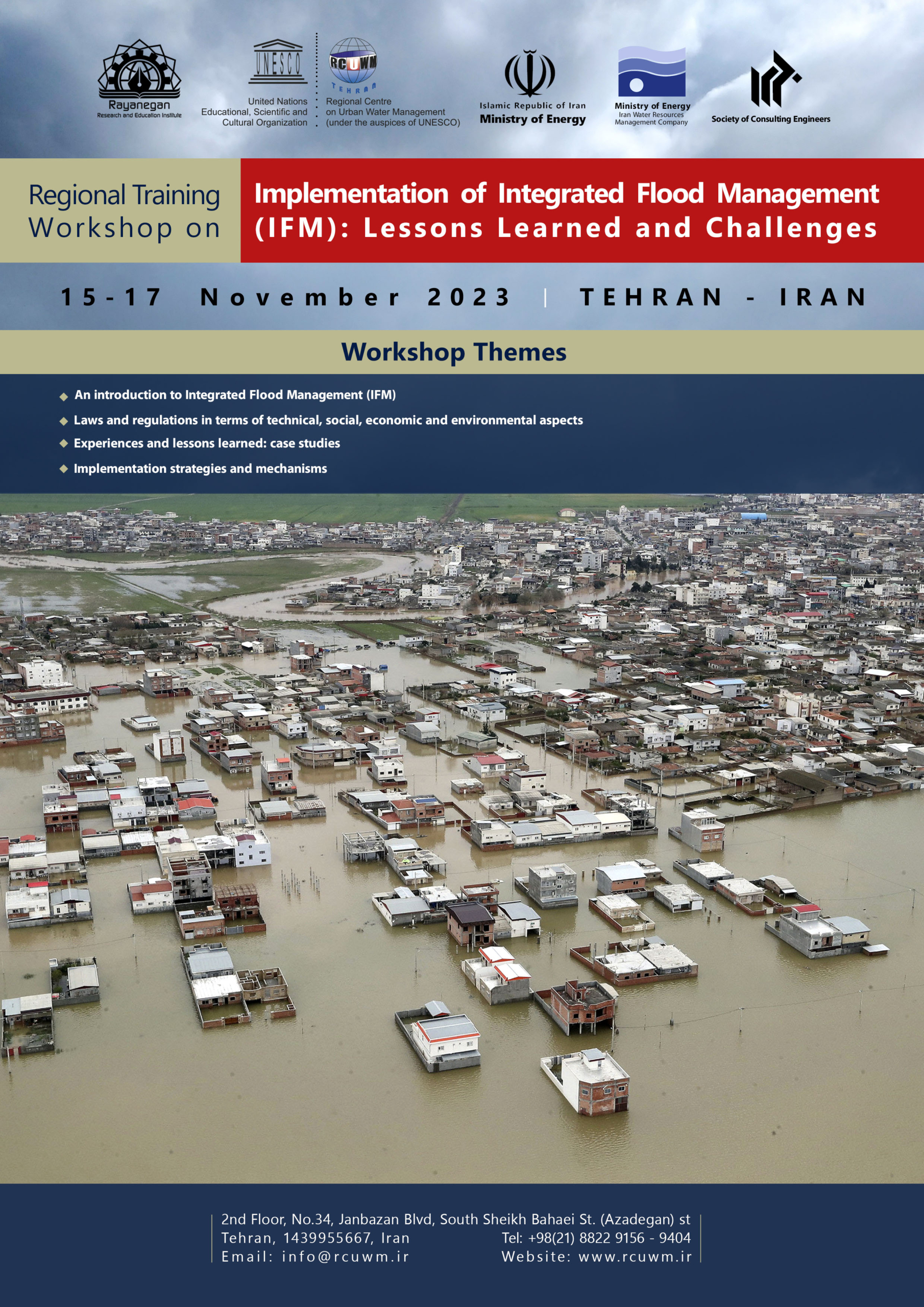Regional Training Workshop on Implementation of Integrated Flood Management: lessons learned and challenges
15th – 16th November 2023, Tehran, Iran
Register: https://elearning.rayanegan.com/login/signup.php?
Agenda
Presentation Files:

1.Introduction
After successfully conducting 13th Governing Board Meeting at 23th February 2023, it was decided that in line with the proposed plans in the meeting about transferring experiences and technical knowledge in the field of integrated river management the book entitled introduction to Integrated Flood Management which is extracted from technical publications of the APFM has completed in Persian and widely published. Recently, development of urbanization and consequences of climate change and flood mismanagement have caused an obvious increase in human casualties and financial losses due to flood particularly in developing countries located in the West Asia and Central Asia.
Regional Centre on Urban Water Management (Under the Auspices of UNESCO) in order to pursue its goals on training and capacity building and transferring executive experiences and scientific research in the field of flood management across the member states of the governing board has decided to hold a training workshop in line with implementation of integrated flood management (IFM) via coupling with APFM program and World Meteorological organization.
In IFM approach, it is important that between utilization from flood flow, flood plain from a point of view and acceptance of risk of potent destroying floods in susceptible regions from another point of view a balance has been created. To illustrate it more, IFM is a process that via connecting to programs of water and land development in catchment sale is providing maximum utilization from floods and flood plains and simultaneously decreasing human casualties and financial losses due to floods. Implementation of IFM concept across regional countries that usually have arid and semi-arid climate could have benefits such as providing the water that has been gathered from floods, improving resiliency against floods via deployment of people participation and also reduction of negative impacts of suddenly happening floods.
2.targets of holding workshop
2-1- training and familiarization of experts and participants with concepts of Integrated Flood Management and it’s aspects.
2-2- enhancing the level of technical knowledge required to implementation of IFM concept in the country and among consultancy engineering society and related governmental managers.
2-3- exchanging updated experiences in the field of flood management with member states of the governing board of the regional center on urban water management (under the auspices of the UNESCO)-RCUWM
*member states of the governing board of the RCUWM in ministerial or deputy ministerial in the water sector: Azerbaijan, Armenia, Uzbekistan, Afghanistan, Iran, Bangladesh, Tajikistan, Turkey, Pakistan, Seri Lanka, Syria, Iraq, Oman, Qatar, Lebanon, Egypt and India.
3.Audiences and Participants
The audiences of this workshop include:
- Managers or senior experts of the member states of the governing board of the RCUWM ( each country at least 1 person ), total: 15 to 20 persons
- Iranian Consultancy Engineers including 30 active and top consultant companies ( each company 1 person ), Total: 30 persons
Collection of consultant in the fields of river engineering, Watershed management, society and etc. would be selected via coordination of Iranian consultancy engineers society.
- Senior governmental managers and decision makers in the field of flood management in Iran including:
- Ministry of Energy including
- Ministry of energy headquarters, Iranian national company of water resources management specifically managers of the catchments, total: 20 to 25 person
- Regional water companies, energy and water resources development company ( 31 companies, each company 1 person), total: 32 person
- Ministry of Agriculture ( including ministries’ representatives and natural resources and watershed management organization), total: 3 persons
- Ministry of interior ( including national disaster management organization, Municipalities and villages organization and municipality of Tehran ), total 5 person
- Ministry of roads and urban development ( including road transportation sector’s representatives, national meteorological organization ), total: 3 persons
- Other institutions (including planning and budget organization, housing foundation of Islamic revolution, Iranian space agency and infrastructure commission of Iranian parliament ), total: 4 persons
4.Holding Date and Venue
Date of the workshop: 15th November (Wednesday) to 17th November (Friday), 2023.
In this workshop, for day 1 and day 2, 9 hours for training in 6 different sections have been planned and for third day a technical tour of seeing dams or instruments and technologies related to IFM have been planned.
Venue of the workshop: Conference hall of the consultant engineering society.
5.Heads of Main Activities
5-1- making the necessary arrangements with interior sectors including governmental organizations and private sector (consultant engineers) in the field of flood management
5-2- making the necessary arrangements with the RCUWM governing board member states and international institutes like APFM for an active presence and having speeches about experiences and lessoned learned and implementation of IFM in national and regional scale and presenting successful and unsuccessful case studies
5-3- conducting executive committee of holding the workshop including representatives of ministry of energy, RCUWM, national water resources management company and consultant engineering society in order to pursue holding affairs in an appropriate manner
5-4- conducting scientific committee of the workshop for production and supervision of the appropriate and presentable information in the workshop including presenting the experiences of the flood management in Iran, evaluating presentation of foreign speakers, recording film, clip or animation of flood management such as learned lessons of flood that happened at 2018.
- Official Language
The official language of the workshop would be English. Also possibility of simultaneously translation to Persian would be provided.
- Participation of supporters and financing of expenses
Regional centre on urban water management, national water resources management company and consultant engineers society as in charge of the implementation of the programs of the rivers and floods in the national and regional scale, will provide all expenses (including flight ticket only for foreign speakers, accommodation and transportation of foreign speakers) and also catering cost for the interior guests will be provided.
8.Expected Results and Outputs
Improving capacity and technical knowledge of consultant engineering society and managers in charge of flood management in order to apply IFM in Iran through developing a strategic plan and road map of IFM according to logical and executive capacities of the country to enhance resiliency against future floods due to climate change and seasonal Munson precipitation.
9.Way Forward
Based on the increasing need to appropriate management across all governing board member states and also because of existing of a huge gap between raising the IFM concept (early 21st century) and implementation of that it is required that designing vision, scientific, training, cultural and executive road map to apply IFM on national and regional scale according to different situation of catchments in countries must be developed and legal and executive arrangements should be followed. Therefore, conducting IFM committee from representatives of governing board member states is a necessary action.
10.Workshop Agenda
AGENDA (First day, Wednesday – November 15, 2023)
| Time (IST) | Topic |
| 8:00 – 8:15 | Reception |
| 8:15 – 8:30 | National anthem & Quran |
| 8:30 – 10:00 | Opening Ceremony |
| · H.E. Mr. Mehrabian, Chairman of RCUWM Governing Board and Minister of Energy, I.R. Iran (10 min – video message)
· IFM First video clip playback (5 min) · Mr. Hajrasouliha, Director, Regional Centre on Urban Water Management (15 min) · Mr. Jamalinejad, Deputy Minister of Interior for Civilization and Development, Iran (15 min) · Mr. Ebrahimnia, Director of Water, Agriculture & Environment, Plan and Budget Organization, Iran (15 min) · Mr. Shamshirsaz, Chairman of the Board, Iranian Society of Consulting Engineers (15 min) |
|
| 10:00 – 10:30 | Break |
| 10:30 – 12:00 | Technical Session No. 1: IFM Concept and Principles |
| 1.1. Concept and application of IFM
Mr. Ramesh Tripathi, Adaptation Fund Project Officer, APFM, WMO (25 min) 1.2. Social and institutional aspects of IFM Mr. Gabriele Quinti, General Secretary of Knowledge and Innovation, Italy (25 min) 1.3. Economic, environmental and legal aspects of IFM Mr. Jos G. Timmerman, Water Frames, Netherlands (20 min) 1.4. Q&A panel (20 min) |
|
| 12:00 – 13:00 | Lunch break |
| 13:00 – 15:00 | Technical Session No. 2: IFM in Iran and the Region |
| 2.1. Flash Floods Mitigation in Oman
Mr. Ahmed Said Al Barwani, Oman Water Society, Oman (20 min) 2.2. Role of flood forecasting and warning in IFM in Iran Mr. Mohammad Asghari, National Monitoring, Forecasting and Crisis Management of Weather Hazards Center, IRIMO, Iran (20 min) 2.3. Flood and sediment control Mr. Ahmet Emirhan Yolcu, State Hydraulic Works (DSI), Flood Control Department, Ministry of Agriculture and Forestry, Türkiye (20 min) 2.4. Role of watershed management in IFM in Iran Mr. Ataollah Ebrahimi, Soil Conservation and Watershed Management Research Institute, Iran (SCWMRI) (20 min) 2.5. Evolution of technical laws and regulations on river and flood management in Iran Ms. Maryam Karami, Iran Water Resources Management company (IWRMC), Iran (20 min) 2.6. Q&A panel (20 min) |
|
| 15:00 – 15:30 | Break |
| 15:30 – 17:00 | Technical Session No. 3: IFM in Iran and the Region |
| 3.1. IFM in Iraq
Mr. Ahmed Alshukri, SCODAR, Operation and Maintenance Department, Ministry of Water Resources, Iraq (20 min) 3.2. Indian strategy to deal with flooding in various states Mr. Anup Kumar Shrivastava, Executive Director, NMCG, Ministry of Jal Shakti, India (20 min) 3.3. Role of consulting engineers to implement IFM Mr. Reza Esmaeili, Iranian Society of Consulting Engineers (15 min) 3.4. Institutional and steering mechanisms of IFM in Iran: Policy-makers and clients Mr. Majid Sayyari, Water Resources Management Expert, Iran (15 min) 3.5. Q&A panel (20 min) |
|
AGENDA (Second day, Thursday – November 16, 2023)
| Time (IST) | Topic |
| 8:15 – 10:00 | Technical Session No. 4: Experiences and Lessons Learned |
| 4.1. IFM Second video clip playback (5 min)
4.2. Integrated flood control plan (case study: Kashkan Basin, Iran) Mr. Amin Farzadi, Water and Power Resources Development Company, Iran (30 min) 4.3. Integrated flood management (case study: Kan River basin, Iran) Ms. Fatemeh Javadi, Water Research Institute, Ministry of Energy, Iran (15 min) 4.4. Integrated flood and drought EWS (case study: VFDM, Africa) Mr. Roberto Rudari, CIMA Research Foundation, Italy (40 min) 4.5. Q&A panel (15 min) |
|
| 10:00 – 10:30 | Break |
| 10:30 – 12:30 | Technical Session No. 5: IFM in Cities and its Implementation Mechanism |
| 3.1. IFM Implementation Strategies
Mr. Ramesh Tripathi, Adaptation Fund Project Officer, APFM, WMO (20 min) 3.2. IFM in Tehran City Mr. Ali Nasiri, Tehran Disaster Mitigation and Management Organization, Iran (20 min) 3.3. Flood & water quality management in Pakistan: focus on Sindh & Baluchistan Mr. Ghulam Murtaza, Pakistan Council of Research in Water Resources, Karachi, Ministry of Water Resources, Pakistan (20 min) 3.4. Flood management in Iran (before, during and after a flood disaster) Mr. Seyfollah Aghabeygi, Disaster Management and Passive Defense Office, IWRMC (20 min) 3.5. Q&A panel (40 min) |
|
| 12:30 – 13:00 | Closing Ceremony |
| · Mr. Nami, Head of National Disaster Management Organization, Iran (15 min)
· Mr. Hajrasouliha, Director, Regional Centre on Urban Water Management (15 min) |
|
| 13:00 – 14:00 | Lunch Break |
Suggested topics to be presented by foreign professors and experts:
- Policies and technical, social, economic and environmental rules
- Experiences and lessons learned: case study and implementation
- Operational strategies and mechanisms (with focus on topics like participation of stakeholders, training, capacity building and informing, how to combine integrated flood management with urban management, prediction and alarming of floods system and how to consider climate change phenomenon



